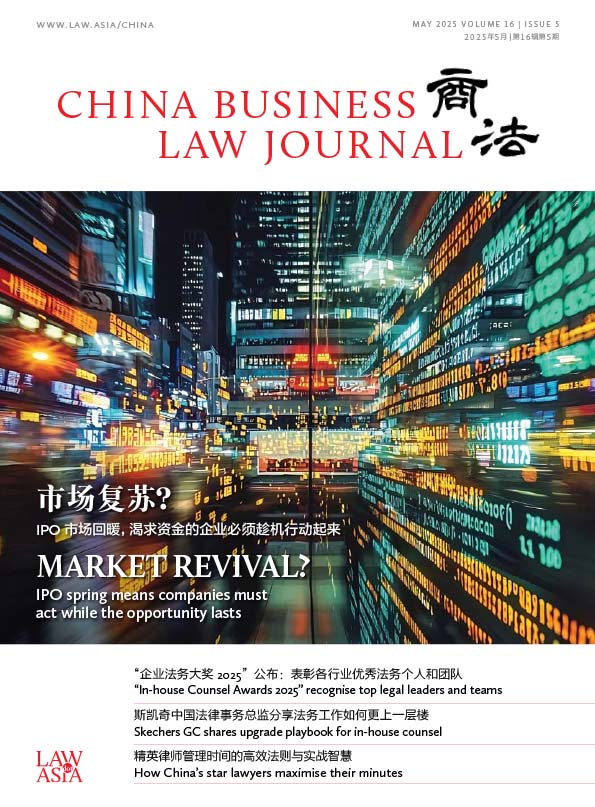A GUIDE TO
CAPITAL MARKETS
IN CHINA AND HONG KONG
In the past year, the initial public offering (IPO) markets in Hong Kong, the US and mainland China have told a tale of mixed fortunes. Benefiting from policy tailwinds and market conditions, a surge of A-share listed companies seeking a dual listing status in Hong Kong, mainly featuring hard tech and new quality productive forces, has carved out a window of opportunities for Hong Kong’s capital market.
Meanwhile, mainland companies eyeing US listings continue to find niche opportunities amid geopolitical headwinds in specialised sectors, although multidimensional challenges still loom. The persistently sluggish mainland IPO market mirrors a regulatory environment of “tightened oversight, enhanced compliance and performance-driven scrutiny”, underscoring a paradigm shift towards quality and sustainable development for listed companies
List of contents
Listing shares in more than one financial market is often seen as a major step in a company’s development as it signals recognition by international investors, and an enhancement in liquidity and valuation. For PRC companies listed on domestic A-share markets, issuing H shares on the SEHK has become a more popular strategic expansion … (Read more >)
This year’s government work report stated: “Promote the development of cross-border e-commerce, improve the cross-border delivery logistics system and strengthen the construction of overseas warehouses.” This marks the 12th consecutive year that cross-border e-commerce has been mentioned in the government work report, highlighting China’s commitment to advancing the sector … (Read more >)
This article seeks to clarify the connection between income indicators highlighted by recent IPO obstacles faced by pharmaceutical companies, the relevant IPO regulations and the basic logic linking these issues to anti-corruption efforts in the sector … (Read more >)
The separation of ownership and control creates agency problems that underpin the need for robust corporate governance in listed companies. As research evolves, governance frameworks increasingly address balancing interests between majority and minority shareholders, as well as between shareholders and external creditors … (Read more >)
In April 2024, the State Council issued the Opinions on Strengthening Regulation, Preventing Risks and Promoting the High-Quality Development of the Capital Market, introducing comprehensive measures to refine the share reduction regime … (Read more >)
To optimise the regulatory framework for corporate bond issuance and financing, step up the transparency of bond review and promote high-quality market development, the Shanghai Stock Exchange (SSE) issued the Guidelines No. 3 for the Application of Rules for Review of Corporate Bond Issuance and Listing – Key Review Focuses on 28 March 2025 … (Read more >)
On 15 May 2025, the Supreme People’s Court and the China Securities Regulatory Commission jointly issued the Guidelines on Strict and Impartial Law Enforcement to Serve High-Quality Development of Capital Markets, marking a significant step in refining judicial rules for securities misrepresentation cases … (Read more >)
Previously, foreign-invested enterprises (FIEs) in China found legal basis for their establishment and operations chiefly in the Law on Joint Ventures Using Chinese and Foreign Investment, the Law on Wholly Foreign-owned Enterprises, and the Law on Chinese-Foreign Contractual Joint Ventures … (Read more >)
One of the hottest topics in the contemporary capital market is the promulgation of Several Opinions of the State Council on Strengthening Regulation, Preventing Risks and Promoting the High-Quality Development of the Capital Market, known otherwise as the new National Nine Articles … (Read more >)
Disregard of corporate personality, also known as piercing the corporate veil, is a system designed to prevent shareholders from abusing the independent corporate personality of a company in order to escape their responsibilities to creditors and the … (Read more >)
Share buyback agreements are common in equity investment in target companies. However, investors often encounter challenges in enforcing these agreements during disputes. Proactive planning during the investment phase can help mitigate future risks … (Read more >)
In recent years, continual development of the market economy has led to a surge in shareholder disputes, significantly impacting company growth. Consequently, it is crucial for legal counsel to effectively manage these disputes … (Read more >)
As a crucial component of China’s multi-tiered capital market, the Beijing Stock Exchange (BSE), established in September 2021, is approaching its third anniversary. According to official data, 239 companies with a total market value … (Read more >)
The year 2023 marked the beginning of China’s systematic and regular oversight of overseas listings of Chinese enterprises, and those already listed abroad. With relevant policies in place for more than a year, … (Read more >)
The Stock Exchange of Hong Kong (SEHK) proposed enhancing corporate governance of its 2,600 listed issuers on the Main Board and GEM in a mid-summer consultation paper titled Review … (Read more >)
China’s comprehensive registration-based IPO reform has enshrined information disclosure in new listing criteria under the approval-based system to information disclosure requirements. … (Read more >)
On 1 June 2024, Jinzhou Port issued an announcement reporting that it had received a notice of administrative penalty and a market ban from the China Securities Regulatory Commission and included the full content of the notice. … (Read more >)

Feng Gang
Senior Partner
DOCVIT Law Firm

Liu Peining
Paralegal
DOCVIT Law Firm
7 August 2024
China’s newly revised Company Law will be in effect from 1 July 2024. This law introduces a classified share system for the first time, with articles 144 to 146 detailing the issuance of classified shares. … (Read more >)
With increasing regulatory scrutiny in the securities market, the legal risks for issuers and intermediaries involved in securities offerings have significantly risen. Drawing from the first … (Read more >)
On 15 March 2024, the Supreme People’s Court (SPC) and the Supreme People’s Procuratorate released the Interpretation of Several Issues Concerning the Application of Law … (Read more >)
The securities regulatory field has established a new norm of cracking down on and preventing information disclosure violations. The China Securities Regulatory Commission … (Read more >)
Determining horizontal competition is a key consideration for enterprises; relevant to issues ranging from IPO eligibility and qualification for refinancing or major asset restructuring … (Read more >)
A company must showcase its business operations at the time of an IPO, but even after a successful listing it is still required to maintain sufficient operations. The Stock Exchange … (Read more >)
In the past decade, there has been an increase in the incidence of illegal and criminal cases in the securities industry in China. Regulatory and judicial authorities have been increasingly strict … (Read more >)
During IPO processes, regulatory bodies scrutinise whether companies have completed the requisite registrations and forex procedures for their overseas subsidiaries. … (Read more >)
A wave of financial products known as “directed financing instruments”, “directed debt financing instruments”, or “directed financing plans” flooded the market around 2018, … (Read more >)
Disclosure of information has been at the core of China’s shift to the current across-the-board registration-based IPO system, which replaced the more cumbersome and inefficient … (Read more >)
The Financial Services and the Treasury Bureau of the Hong Kong government and the Hong Kong Monetary Authority (HKMA) conducted public consultations in December 2023 … (Read more >)
The new Company Law has enhanced the system of registered capital subscription and registration, stipulating that limited liability companies must fully pay up their registered capital … (Read more >)
Equity financing is vital to the development of startups, usually making a difference in their survival. Therefore, investors are often praised as “white knights” of investee businesses. … (Read more >)
When a company intends to go public, it will bring investors in for capital increase. In the transaction documents, a valuation adjustment mechanism (VAM, also known as a “bet-on agreement” in China) … (Read more >)
During compulsory execution, the people’s court may legally inquire, freeze and sell stock assets held by the subject person, pursuant to article 249 of China’s Civil Procedure Law. … (Read more >)
Information disclosure is the cornerstone of the securities market’s existence and development, and an important safeguard for investor interests. Securities misrepresentation … (Read more >)
Equity governance is the key to corporate governance. According to the Company Law, except for one-person limited liability companies and wholly state-owned companies, … (Read more >)
Private equity (PE) funds come in three organisational types: corporate, partnership and contractual. Unlike the first two, contractual PE funds do not establish a company or … (Read more >)
The Stock Exchange of Hong Kong (SEHK) began consulting the public in September 2023 on proposals to reform the board of the Growth Enterprise Market (GEM) after observing a … (Read more >)
In investment and financing projects, investors often seek to appoint directors to the investee company to ensure a certain degree of voice. Given that directors have such specific legal obligations as duty of loyalty and duty … (Read more >)
Amid the backdrop of ongoing regulatory reforms and an expanding capital market, the signals for stricter oversight continue to grow stronger. In this high-pressure environment, participants in the securities market are … (Read more >)
In August 2023, Hong Kong’s Securities and Future Commission (SFC) announced it would proceed with amendments to the insider dealing provisions of the Securities and Futures Ordinance. … (Read more >)
Growing discontent with corporate governance and subsequent demands for the removal of directors have become increasingly common in listing companies. In practice, the review of such proposals by entities … (Read more >)
Four years have elapsed since the launch of the Star Market, in which semiconductor enterprises account for nearly 20% of the lineup, raising nearly 50% of the total proceeds in the first half of this year. … (Read more >)
Stock market manipulation can be broadly divided into trading-based manipulation and information-based manipulation. The former requires significant advantages in funds and securities holdings … (Read more >)
As members of the first group of Chinese lawyers to visit the US after the end of the pandemic, the authors had the opportunity to exchange information with experts, scholars and senior executives of top … (Read more >)
From 1 June, Hong Kong’s Securities and Futures Commission (SFC) has adopted a regulatory regime applying to all centralised trading platforms for virtual assets (VAs), whether or not such assets are non-security tokens. … (Read more >)
As China’s financial reform and global engagement deepens, accompanied by an increasing demand for cross-border investment and financing, domestic asset management institutions are actively expanding. … (Read more >)
Guided by the gatekeeper theory in China’s capital market, the Securities Law underwent revisions in 2005, holding all securities service institutions fully jointly liable for misrepresentations made by securities issuers … (Read more >)
The 1997 publication of the Red Chip Guidelines may be a relic of the past century, but the concept and terminology surrounding the red-chip structure persist. Since Sina’s historic debut on the Nasdaq … (Read more >)
Specialist technology companies (STCs) have been afforded a path to listing on the Stock Exchange of Hong Kong (SEHK). The exchange published the conclusions of its consultation on the matter on 24 March 2023 … (Read more >)
With the rapid development of technology, the scale of data processed by enterprises has been growing exponentially. Consequently, data compliance has garnered increasing attention from … (Read more >)
A recent Chinese TV drama, The Youth Memories, tells the inspiring story of a group of Beijing youngsters in the 1970s finding strength from each other to overcome a multitude of challenges while growing up through gaokao national exams … (Read more >)
The Stock Exchange of Hong Kong (SEHK) has instituted reforms since 2018 to attract more diversified listing applicants, especially those from new-economy industries. It has formulated specific listing regimes … (Read more >)
On 17 February 2023, the main boards of the Shanghai and Shenzhen stock exchanges adopted the registration-based mechanism for reviewing IPOs, signalling completion of the reform across China’s capital market … (Read more >)
The Trial Measures for the Administration of the Overseas Offering and Listing of Securities by Domestic Enterprises and five supporting guidelines were implemented on 31 March … (Read more >)

Wang Bo
Partner
Commerce & Finance Law Offices
31 July 2023

Peng Caixia
Associate
Commerce & Finance Law Offices
Proceed with caution
This April, the issuance of Several Opinions of the State Council on Strengthening Regulation, Preventing Risks and Promoting the High-Quality Development of the Capital Market, commonly referred to as the third set of the National Nine Articles, became the talk of the town.
Power moves
Comprehensive implementation of the across-the-board, registration-based listing mechanism is overarching reform with far-reaching implications, leaving an indelible imprint on the development of China’s capital markets. The success of the universal registration-based system relies on the diligent performance of market players, while rigorous enforcement of the delisting regime for listed companies, and the improvement of due diligence standards of intermediaries, pose new challenges for the industry.





















































































































